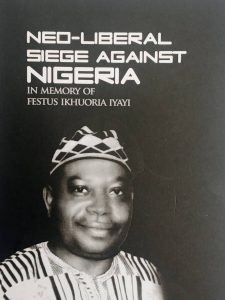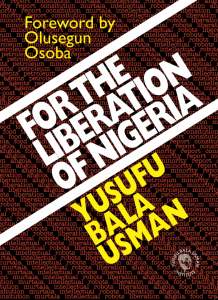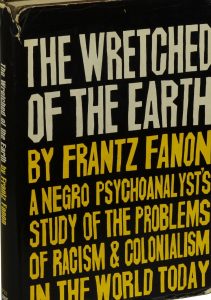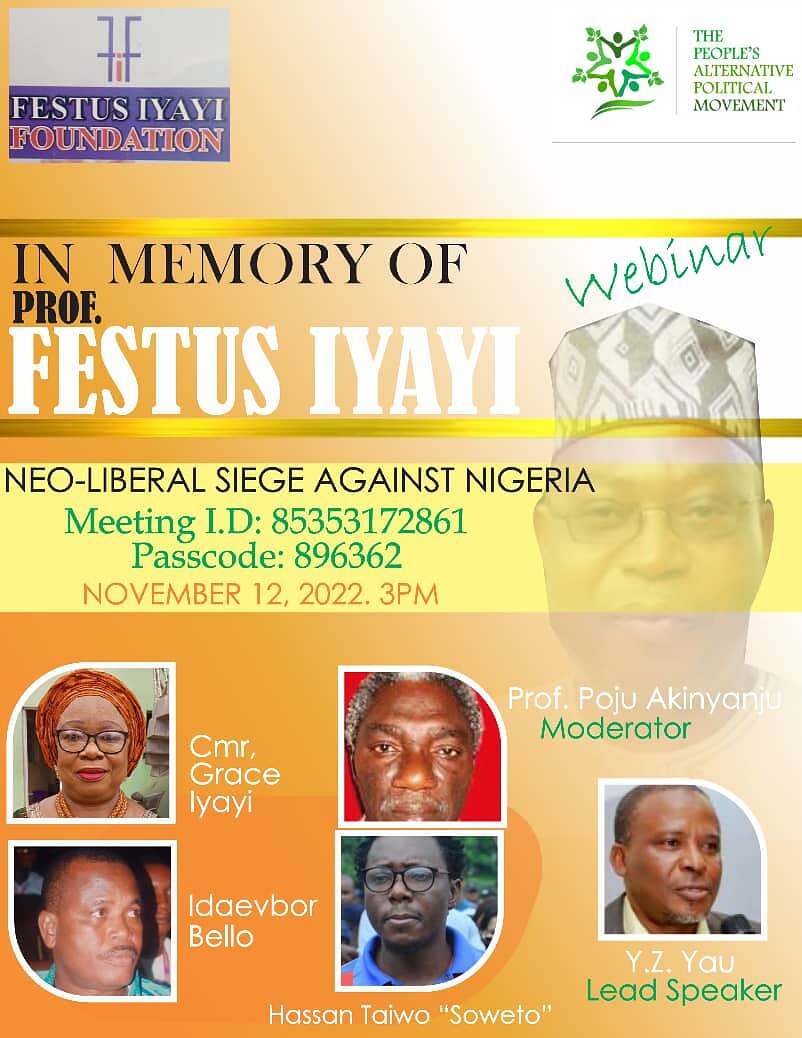It must, indeed, be great that, in spite of the tribulations tormenting Nigerians, the rump of the Nigerian Left was still able to put together an Online Session to mark the 9th Anniversary of Dr. Festus Iyayi, the top flight activist and academic who perished on a road accident that day that year. That was, in the circumstances, a remarkable performance for a remarkable individual. Iyayi was a remarkable individual, something that some of us only came to realise after his demise when we reflected on encounters with him, either as student leaders or in an office in the Nigeria Labour Congress, (NLC) and in his hotel rooms on the few occasions that such was the case. On a particular crisis at the NLC, at a certain point, for instance, Dr. Iyayi and Prof Toye Olorode became the only beacons whose spoken and ‘silent’ communications provided the meaning of what was happening for those of us who were distant from the theatre.

Neoliberalism is a text whose meaning – action nexus depends on how one reads and articulates it rather than any fixed meaning
But, authenticity aside, he was an unusual combination of capabilities. He was and remains a teacher, if we follow Achebe’s thesis of the writer as a teacher. He was a teacher in the generation who took lecturing as a privileged location because it puts them in the thick of nation building, given that students listen to their teachers more than they do to their parents (except perhaps now in the age of intrusive social media platforms) and certainly more than so-called leaders in the typical postcolonial state preaching what nobody beyond their obsequious gang of followers and bootlickers takes seriously.
Of course, he was an activist par excellence, that being what brought him in line of fire from an insecure establishment that considered crudity a permissible way of ‘war’. It is from his displacement in this process that his greatest contribution to the struggle manifested via the strategy of the re-invention of the self in the face of adversity. His conversion of the period of his dismissal from the services of the University of Benin into an experiment in money making, so to say, was such a very positive demonstration of late Prof Ake’s argument that, with the kind of skills a typical scholar embody, they should be able to pay their bills through decent means without begging anybody.
Above all, Iyayi had a model of the Nigeria in terms of the object of the struggle. It is one thing to be radical but another to have a version of society in view as can be gleaned from the story Intervention published earlier, “So, What Might a Great, Successful Nigeria Look Like?”. Otherwise, struggle for social change would be nothing but infantilism. Yes, Bala Usman, much, much earlier than Iyayi, came up with For the Liberation of Nigeria but that was an ideological critique, not a model. All are fine but the two are different ways of doing it.
 So, a combination of these makes Iyayi an all-time signifier, one among many others but, more so in the cloudy circumstances of his death. He died on active service, directly in line of duty. He is most worthy of Steve Aluko, aka Maradonna’s prayer format: may his soul never rest in peace but, even more restlessly, torment our tormentors.
So, a combination of these makes Iyayi an all-time signifier, one among many others but, more so in the cloudy circumstances of his death. He died on active service, directly in line of duty. He is most worthy of Steve Aluko, aka Maradonna’s prayer format: may his soul never rest in peace but, even more restlessly, torment our tormentors.
We should express gratitude to providence that he is a writer and, being so, remains a participant in the debates on the remaking of Nigeria, a very touchy issue in the week that the G20 is meeting without Nigeria taking its seat in the nucleus of the emerging world order. And Nigeria is not there simply because the ‘world’ sees it as just too divided at home to be of any use in how the world may be run. So, Nigeria was dropped from the final list and replaced with one of the three existing empires today. (I don’t mean empire in a military-territorial sense here). That is the connecting thread between ‘Celebrating Iyayi’ on the one hand and ‘textualising the future’ on the other hand.
We here in Intervention would argue that the totality of Iyayi’s novels speak to this issue almost in the same wavelength that the leading postcolonial writers, particularly Fanon, did in the warning he issued about the day after Independence: what the emergent leaders were going to do to their own people. His novel, Violence captures this very well. And, away from the fictional lens, he developed a list of what a Nigeria should have been celebrating at the age of 50 and thereafter, none of which Nigeria is close to. There is a sense in which neoliberalism is central to why Nigeria is so far away from any of Iyayi’s list. In that sense, there is something appropriate in the topic on which the anniversary was anchored. But does neoliberalism have a fixed, unchanging or universal meaning? Is it so strong and complete in what David Harvey calls its creative destruction? And even if it were, is it our business to empower it by promoting a disempowering narrative of a siege, in spite of the lightning strikes against it that sent shock waves in 1987 and 1989 and many more? Would it not be more productive to focus on what accounts for the relatively limited achievements of the struggle against neo-liberalism in Nigeria, the struggle in which Iyayi and many others perished, physically and otherwise?
 As successful as it has been in its mission of ‘creative destruction, neoliberalism has not been so successful everywhere. In many places, it has been contested and overwhelmed by looking at its weaknesses and delivery debits, by abstracting and weaponising its contradictions to hurt it. Stories of struggles that successfully reversed “accumulation by dispossession”, another of Harvey’s phases, should instruct us in this regard, particularly those that did this with what the social media could be made to accomplish in this wise. And yet, the social media is part and parcel of the capitalism – neoliberal globalisation continuum.
As successful as it has been in its mission of ‘creative destruction, neoliberalism has not been so successful everywhere. In many places, it has been contested and overwhelmed by looking at its weaknesses and delivery debits, by abstracting and weaponising its contradictions to hurt it. Stories of struggles that successfully reversed “accumulation by dispossession”, another of Harvey’s phases, should instruct us in this regard, particularly those that did this with what the social media could be made to accomplish in this wise. And yet, the social media is part and parcel of the capitalism – neoliberal globalisation continuum.
There is a second point to draw attention to in situating the Iyayi memorial. It is the question of who attended. By its very nature, the Zoom Session means the audience was the same set of people speaking the same slangs in radical politics over the years, excluding the folks who have been so successful in converting economic adversity to creativity that can be deployed. That radius is outside of the audience: the musicians in Ojuelegba down to Nollywood and so on. Supposing the anniversary was a carnival in Benin or one such place in which the creativity of these folks communicated the symbolism of an Iyayi to a wider Nigerian audience in a more accessible language? Let’s see the governors, ministers or legislators who can still steal the quantum of public resources since 1999 when the mastery of the dynamics of neoliberalism can be broken down and communicated through popular culture. There is no suggestion here that popular culture is inherently radical or even conscious of radical democratic politics. Popular culture is not an inherently radical or conservative space but a very viable agenda conveying space, a lot of it depending on who first bursts on the space. As it is now, elements of the Nigerian Left have better chances of capturing much of that space as additional troops of radical democratic articulation. We do not have to name the particular individuals with such capability now. The left must begin to raise its discursive capacity as well as communicating its message in a language people understand because, under digital or informationalised capitalism, the revolution is most unlikely to assume the form of a Jacobinist storming of the Bastille or frightening the Tsar to escape into London but, most likely, Hegemony as strategy.
That is a great, positive development for an ageing and ideationally as well as materially challenged Left establishment but which must not leave Nigeria to chances, particularly that the process of self-reproduction has been a mission beyond accomplishment. Intervention wishes Iyayi and fellow travellers, (most reently Seinde Arigbede and Bello Aidoloje) never rest in peace but remain active in tormenting the tormentors of the people of Nigeria! Thanks to the organisers!




























